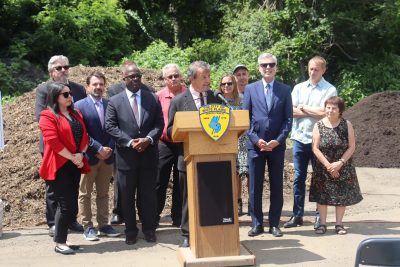White Plains Creates On-Site Food Scrap Composting Facility
News Based on facts, either observed and verified directly by the reporter, or reported and verified from knowledgeable sources.
 The City of White Plains has begun in-house food scrap composting with the assistance of Westchester County.
The City of White Plains has begun in-house food scrap composting with the assistance of Westchester County.
Utilizing the county’s CompostED composting facility as a model, the city established a compost site at the Gedney Recycling Yard. White Plains residents can continue to drop-off food scraps at the Gedney Yard, which will be composted on site.
“One of the original goals of the CompostED facility was to serve as a model for our municipalities to see local food scrap composting in action and be able to envision such a facility in their communities,” Westchester County Executive George Latimer said. “The City of White Plains officials saw the possibilities and have now made local composting a reality in their community. We are especially proud that the first municipality to take this step is also the county seat. We encourage other communities to look to their own backyards to manage food scraps and reduce their waste in this way.”
The site harnesses the potential of the food scraps to create nutrient-rich soil and contribute to a greener future for the next generation. Officials said the new local, on-site process demonstrates White Plains’ commitment to environmental stewardship and the pursuit of sustainable solutions.
“By adding on site food waste composting to our existing composting program we eliminate the trucking of food waste to a remote site reducing our carbon footprint,” said White Plains Mayor Thomas Roach. “With the assistance of Westchester County we have successfully developed an efficient and financially feasible composting program that ensures the environmental benefits are more fully achieved.”
The new service allows community members to dispose of food scraps, including fruit and vegetable peelings, coffee grounds, eggshells, and other organic materials, in an environmentally responsible manner. The facility will transform the organic waste into nutrient-rich compost, which can then be used to improve soil health, promote plant growth, and reduce the need for chemical fertilizers. By composting locally, White Plains will effectively reduce carbon dioxide emissions by eliminating transportation of the food scraps to an offsite location thereby taking a meaningful stride toward achieving its sustainable goals.
According to a report commissioned by the county’s Department of Environmental Facilities (DEF), food scraps comprise approximately 22% of residential waste. While joining RFSTAD was the first step in reducing the amount of waste, transportation of the waste to composting facilities creates greenhouse gas. DEF created (CompostED) in Valhalla as a demonstration site to educate municipal officials, residents, and students, on the benefits and ease of local composting.
With the guidance of DEF, the city’s Department of Public Works staff was trained in the proper techniques for incorporating food waste into current composting operations. This included guidance on the construction of an Aerated Static Pile System (ASP), a composting technique that accelerates the decomposition process of organic materials by using controlled aeration to enhance microbial activity and facilitate the composting process, while also helping to reduce odors. City employees were able to construct the system at a minimal cost mostly using materials on hand at the site, resulting in very low start-up costs.
In addition, as White Plains will now have an on-site food scrap composting operation, the city will reduce overall costs by eliminating the tipping fee for that waste.

Rick has more than 40 years’ experience covering local news in Westchester and Putnam counties, running the gamut from politics and crime to sports and human interest. He has been an editor at Examiner Media since 2012. Read more from Rick’s editor-author bio here. Read Rick’s work here: https://www.theexaminernews.com/author/pezzullo_rick-writer/
